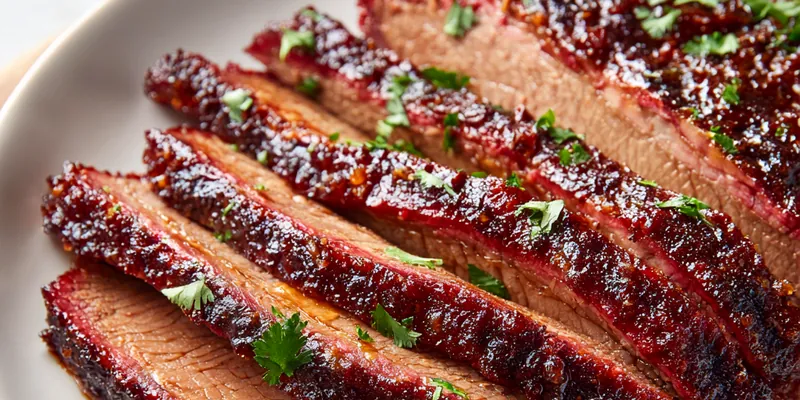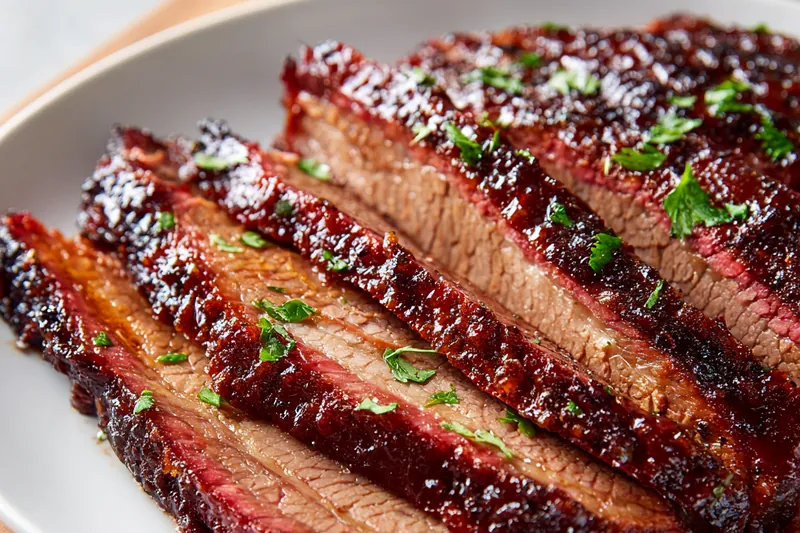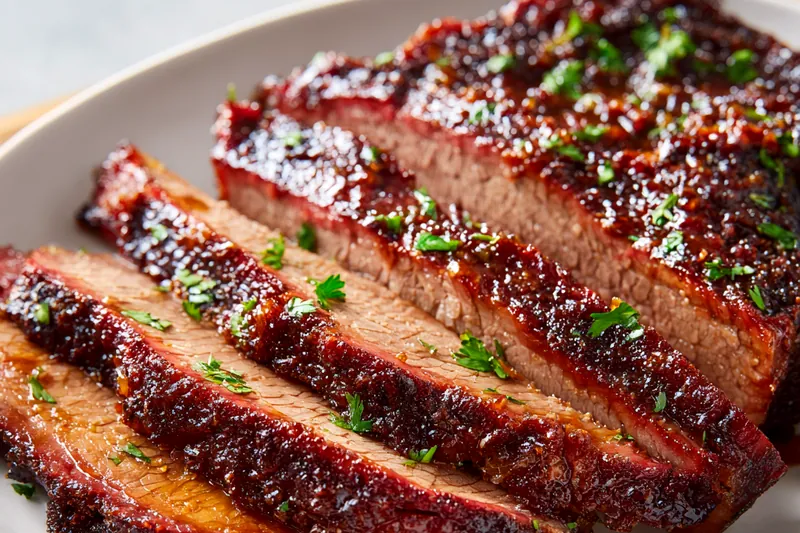Authentic Texas-Style Smoked Brisket
Tender, juicy Texas-style smoked brisket with a perfect bark and melt-in-your-mouth texture. Traditional barbecue at its finest.

The Art of Texas Brisket
Authentic Texas brisket is all about simplicity and technique. The traditional salt and pepper rub, known as 'Dalmatian rub' for its black and white appearance, allows the natural beef flavor to shine through while the long smoking process develops an incredible bark and tender interior.
The key to perfect brisket lies in temperature control, patience, and understanding the meat. A whole packer brisket contains both the lean flat and the fatty point, each requiring slightly different handling but cooking together to create the perfect balance of flavors and textures.
💡 Professional Tip
Look for the 'jiggle test' - when the brisket is properly cooked, it will have a slight jiggle like Jell-O when gently shaken. This indicates the collagen has fully broken down into gelatin.
Frequently Asked Questions
Oak is the traditional choice in Texas, providing steady heat and mild smoke. Hickory adds more flavor, while mesquite gives an intense, distinctive taste. Avoid over-smoking with strong woods.
Use a combination of internal temperature (93-96°C/200-205°F), probe tenderness (slides in like butter), and visual cues (good bark formation and jiggle test).
Wrapping in butcher paper (Texas Crutch) helps power through the stall while maintaining bark texture. Foil works but can soften the bark more than paper.
Rest for at least 1 hour, preferably 2 hours wrapped in towels in a cooler. This allows juices to redistribute and makes slicing easier.
The flat is leaner and slices cleanly, while the point is fattier and often chopped or cubed for burnt ends. Both have distinct textures and flavors.
While possible, you won't achieve the same smoke flavor and bark. If necessary, use a very low temperature (121°C/250°F) and add liquid smoke to the rub.
Wrap tightly and refrigerate for up to 4 days or freeze for up to 3 months. Reheat gently in low oven with a bit of beef broth to prevent drying.
Plan for about 450-500g (1-1.1 lbs) per person raw weight. A 5-6kg (12-14 lb) packer brisket will serve 10-12 people generously.
Recipe Troubleshooting Guide
Dry Brisket
Problem: Brisket turns out dry and tough
Solution: Cook to proper internal temperature, don't trim too much fat, maintain consistent smoker temperature, and ensure adequate resting time.
No Bark Formation
Problem: Brisket doesn't develop a good bark
Solution: Ensure meat surface is dry before seasoning, maintain proper airflow in smoker, avoid wrapping too early, and don't over-spritz.
Temperature Stall
Problem: Internal temperature stops rising around 65-70°C (150-160°F)
Prevention: This is normal! The stall occurs as moisture evaporates. Be patient, maintain heat, or wrap in butcher paper to push through.
Uneven Cooking
Problem: Parts of brisket cook faster than others
Recovery: Position thicker end toward heat source, rotate brisket halfway through cooking, and ensure even heat distribution in smoker.
Bitter Smoke Flavor
Problem: Brisket tastes overly smoky or bitter
Prevention: Use dry, seasoned wood, avoid over-smoking, maintain proper airflow, and ensure clean-burning fire with thin blue smoke.
Flavor Balance Issues
Too Sweet: Reduce brown sugar in rub or balance with more salt and pepper
Too Salty: Serve with pickles, coleslaw, or bread to cut saltiness
Bland: Increase rub application, ensure good bark formation, or add finishing salt

Selecting the Perfect Brisket
Choose a whole packer brisket with good marbling throughout both the flat and point sections. Look for briskets that are flexible, not stiff, and have a consistent fat cap. The meat should have a bright red color and feel firm to the touch.
Prime grade briskets offer the best marbling, but choice grade can produce excellent results with proper technique. Avoid select grade as it typically lacks the intramuscular fat needed for tender, juicy results after the long cooking process.
Essential Ingredient Notes
- Brisket Selection: Look for briskets with good bend flexibility and consistent thickness. Avoid those with hard fat or excessive trimming from the packer.
- Salt Quality: Use coarse kosher salt or sea salt for better texture and more even distribution. Fine table salt can over-season and doesn't provide the same bark development.
- Pepper Grind: Coarse cracked black pepper is essential for authentic Texas brisket. Pre-ground fine pepper burns too easily during the long cook.

Mastering the Smoking Process
Temperature consistency is crucial for proper brisket cooking. Maintain 107-121°C (225-250°F) throughout the cook, using clean-burning wood that produces thin blue smoke rather than thick white smoke which can create bitter flavors.
The smoking process transforms tough connective tissues into gelatin through low, slow heat. This conversion happens gradually over many hours, which is why patience and consistent temperature control are more important than rushing the process.
The Texas Crutch
Wrapping in butcher paper around 71°C (160°F) internal temperature helps push through the stall while maintaining bark integrity better than foil wrapping.
Authentic Texas-Style Smoked Brisket
📋 Ingredients
For the Brisket
- Wood chips or chunks (oak, hickory, or mesquite)Oak is traditional for Texas brisket
- Yellow mustard for binding (optional)Helps rub adhere to meat
- Beef broth or apple ciderFor spritzing during cook
- Butcher paperFor wrapping during Texas Crutch
For the Rub
- 1 whole packer brisket (5-6 kg/12-14 lbs)Choose well-marbled prime or choice grade
- 60g coarse kosher saltFoundation of traditional Texas rub
- 30g coarse black pepperFreshly cracked for best flavor
- 15g garlic powderAdds depth without overpowering
- 15g onion powderComplements the beef flavor
- 15g smoked paprikaEnhances smoke flavor and color
- 10g brown sugarHelps with bark formation
Instructions
Prepare the Brisket
Trim excess fat from brisket, leaving about 6mm (1/4 inch) fat cap. Square off edges and remove hard fat. Pat completely dry with paper towels.
Apply the Rub
Combine salt, pepper, garlic powder, onion powder, paprika, brown sugar, and cayenne. Optional: coat brisket lightly with yellow mustard. Apply rub generously, massaging into meat. Let rest at room temperature for 1 hour.
Prepare Smoker
Set up smoker for indirect cooking at 107-121°C (225-250°F). Add wood chips for smoke. Place water pan if using offset smoker.
Smoke the Brisket
Place brisket fat-side down on smoker grate. Maintain temperature and smoke for 6-8 hours until internal temp reaches 71°C (160°F) and bark is well-formed.
Wrap and Continue
Wrap brisket in butcher paper (Texas Crutch). Return to smoker and cook until internal temperature reaches 93-96°C (200-205°F), about 4-6 more hours.
Rest and Slice
Remove from smoker and let rest wrapped for 1-2 hours. Slice against the grain, separating point and flat. Serve immediately.
Recipe Notes & Tips
Timing
Plan for about 1-1.5 hours per pound at 225°F, but always cook to temperature, not time. Start early morning for dinner service.
Wood Selection
Oak is the traditional Texas choice for its mild, clean smoke. Hickory adds more flavor, while mesquite provides intense smoke - use sparingly with mesquite.
Slicing Technique
Always slice against the grain. The point and flat have different grain directions, so separate them first, then slice each appropriately for maximum tenderness.
